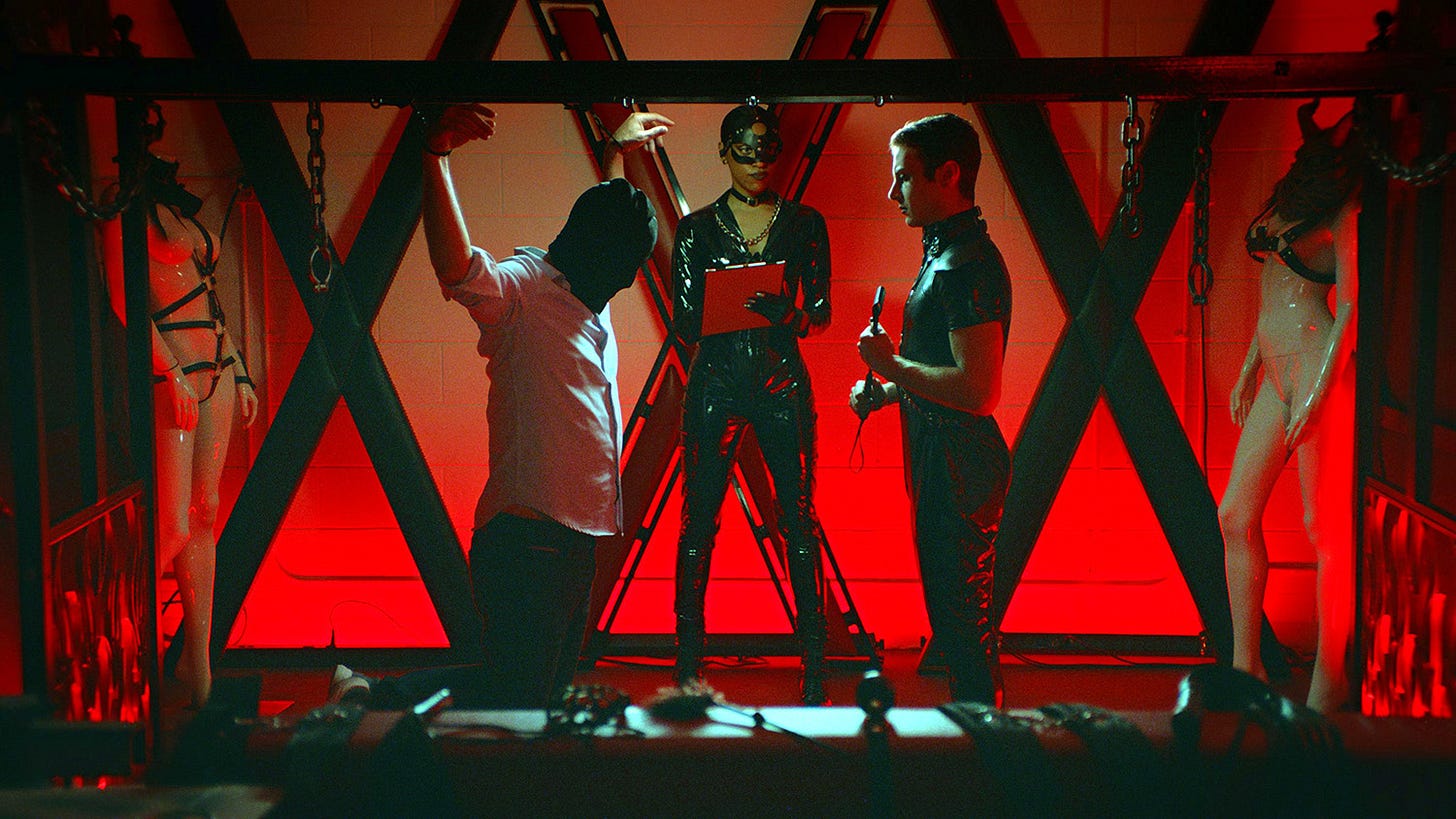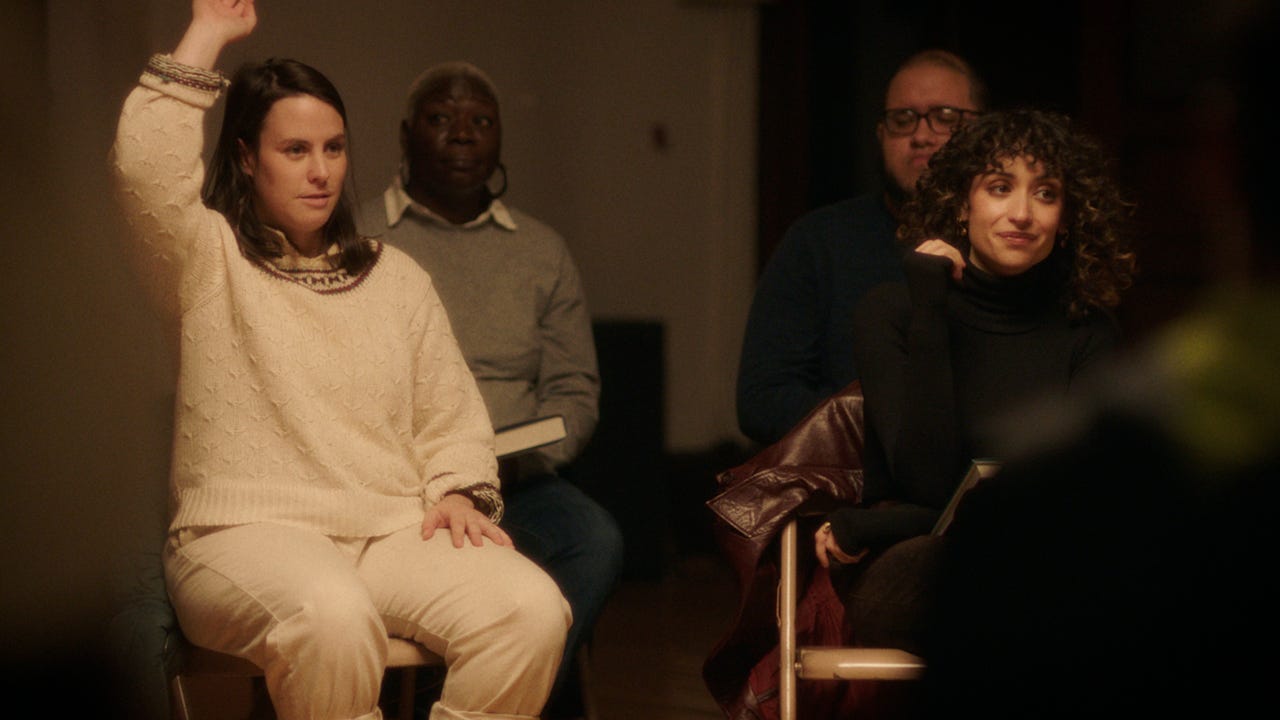Queer Ecstasy Is The Answer in These Tribeca Shorts
To be queer is to be in a constant state of metamorphosis
This piece is part of the Tribeca 2023 coverage here on “I Care About…” //
Spoilers Ahead
If you showed me a calendar and told me to tell you the exact year, month, day, and time that I knew I was queer, it would probably prove to be a more Herculean task than my college thesis was. Similarly, if you tried to ask me when exactly I came out, I honestly wouldn’t be able to tell you. However, if you wanted to know when I “accepted” my queerness, when I came into it, when I found community and queerplatonic love—then I might be able to give you a clearer answer.
The journey to self-acceptance is by no means a linear one. It’s less of a path and more of a dense forest, littered with sharp branches and coarse brambles seemingly designed to set you back. In Daddy Issues, Ecstasy, Let Liv, and Thaw, the concept of “queer self-acceptance” is a throughline that ties these films together. It’s their beating heart, the life force that keeps each of the characters going as they navigate the sorrows of being a “multi-potential-ist,” the sensuality of a chiffon curtain, the joys of saying a Serenity Prayer, and the catharsis of wearing a borrowed dress. These Tribeca Festival shorts are love letters (and homages!) to baby gays and older gays alike that know the journey to self-acceptance is arduous at times, sure, but ultimately rewarding.
“Likes whipping, choking, and…hm, Bridgerton!” Ollie remarks about his newest client before his world promptly turns upside down. Daddy Issues follows an aspiring dominatrix who has an unfortunate run-in with his father during a training gig. This is already a concept where the second embarrassment alone could serve as apt entertainment, but Daddy Issues takes things a step further and allows father and son to hash things out and air their personal grievances towards each other. Their verbal sparring match is both hilarious and grippingly real. “This is your post-graduate job?” Ollie’s father asks him. “I finally find something that’s mine and you can never be happy for me,” Ollie fires back. It’s clear that this fight is about more than Ollie’s new job — when Ollie’s father is face to face with Ollie’s identity, he turns to judgment and ridicule instead of empathy and understanding.
The generational differences between the two are clear here, and something that I personally relate to as someone who is (albeit, on the older side of) Gen-Z. In the workplace, I’ve heard all of the familiar jabs from older co-workers, from confusion about why Gen-Z thrifts so much to questions about why we “don’t want to work anymore.” This sentiment rings true in the film; Ollie is desperately trying to get his father to understand that his life as a sex worker is something that should be cherished instead of ridiculed. Of course, Ollie’s father offers his own kind of empathy by making sure Ollie’s cover isn’t blown…although it makes for an incredibly awkward car ride home. Daddy Issues is a story about a generational clash, but more importantly, it echoes so many queer people’s want to be accepted for who they are — whips and Bridgerton aside.
Has an almost-kiss through a curtain ever been this alluring? In Ecstasy, Teresa mourns the loss of her love, La Purisima, a woman that only seems to exist in Teresa’s mind now, behind curtains and at the top of the stairs, or hidden underneath a hood in the garden. Teresa is only able to observe La Purisima from a distance, as if she’s disconnected from her feelings and never able to truly move on. Ecstasy is an exploration of both mental and physical self-acceptance; Teresa gets in touch with and accepts her sexuality once La Purisma leaves, seemingly drawn in by a nebulous black hole in the sky that she ends up praying to, and finally, giving herself up to.
The names of each of the parts of the film tie everything perfectly together: Part one, “Devotion of the Heart,” depicts Teresa mourning La Purisma, not being able to touch or reach her completely. Part two, “Ruptures,” shows Teresa exploring and discovering herself as a sexual being. Part three, “Devotion to Ecstasy,” depicts Teresa finally embracing her desires and accepting both sides of herself: the carnal and the emotional.
There are multiple ways to look at this film — the religious imagery throughout hints at repression, or an inability to express one’s true desires — which is something that a lot of queer individuals can relate to. I see this film as a celebration of the different types of attraction and how they interact. Sexual and romantic attraction get lumped together all the time, but I can attest to the fact that they are very different things.
It took me a long time to reconcile my queer romantic attraction than it did sexual attraction, to release the ideas of compulsive heterosexuality that had been instilled in me for so long, like all of the Disney princess movies and romance books that told me that I had to marry a man. That mixed in with middle school bible study made for a complicated combination, one that I was able to finally reconcile by accepting myself simply as I am. Teresa does just this: by accepting her want for queer romantic attraction in part one, and accepting her want for queer sexual attraction in part two, she is finally able to reach queer ecstasy which, if you think about it, is just another way to say queer joy.
Is it a sapphic fifth date if things don’t get super personal super quickly? In Let Liv, Liv’s partner Marty takes her to an AA meeting to help both of them on the road to recovery. However, things come crashing down once Liv’s mother Judy arrives at the meeting — after abandoning her daughter for the past ten years. Let Liv is a sardonic yet touching tale about breaking the cycle of generational trauma. In this film, Liv isn’t struggling with accepting her queerness; in fact, she is very secure in who she is and who she loves. However, her journey to self-acceptance is intrinsically tied to her relationship with her mother, and her decision to forgive.
How does Liv reconcile with the fact that her mother left her in order to get sober, knowing that she herself needed help and support? How can Judy make things right? This film doesn’t give any right answers, because there aren’t any. “You being in these (AA meeting) rooms was supposed to keep me out of them,” Liv tells her mother. Liv needed comfort and protection, but her mother was unable to give that to her until she healed herself first. The parallels between Liv and Judy’s journeys are impossible to ignore, and because of that, their paths to healing are linked.
As a first-gen Zimbabwean American, it’s impossible for me to journey through life without thinking of the women who have come before me in my family. I think of the stories that have been passed down to me, from the struggles of colonialism to the incredible pressure that was put on women before me to be the matriarch of the households they led. Women are rarely allowed to be broken, to be complicated. Women are rarely allowed to think of themselves and to ask for help. By forgiving her mother and joining her on her path to healing from substance abuse, Liv is not only breaking the cycle of generational trauma by leaning on her mother, but she is also accepting herself and all of her perfect imperfections.
Where’s my invite to the gender-euphoric dinner party? THAW is a celebration of genderfuckery and queer self-discovery. Set in a lodge in the woods, Smith and Huck, old childhood friends who have since drifted apart, wind up sharing a house together through the winter and learning about themselves and each other in a myriad of ways. From a flowery dress to an old hunting coat to an earring, THAW expertly depicts both Smith and Huck’s want to express themselves differently from how they outwardly present themselves, using beautiful visual imagery to capture their inner worlds and emotions. Huck is drawn to baking and cooking, to the feel of a sundress on their skin, and isn’t much of a hunter or gatherer. Smith is a terrible cook, but they like to chop wood, and they yearn to drape a hunting coat across their shoulders — but the fear of societal expectations stops them.
Once Huck and Smith learn more about each other, preconceived notions start to fall away and the lodge becomes a safe haven for both of them to act out their true desires. In a spectacularly directed dinner party scene, Huck and Smith both play seemingly “traditional” roles of masculinity and femininity, but everything about it is deliciously queer, from the budding chemistry between the two of them to the purposely trite dialogue they use.
If gender is a performance, then Huck and Smith are the players. With a pierced ear here and a shaved head there, they form a tender relationship that allows them to not only rely on each other but to affirm each other and accept each other for who they truly are. Finding and relying on queer community is integral to me; it is so refreshing and validating to make friends with queer individuals who are all in varying stages of their journeys. From older queens I’ve had five-hour-long conversations with at a wine bar, to college friends who have been with me since before I got the bisexual bob, there have always been people surrounding me to support me when I was at my lowest. THAW celebrates queer found family and queer acceptance by putting two characters at a crossroads in a house and allowing us to watch with bated breath as their paths converge.
To be queer is to be constantly in a state of metamorphosis. There’s beauty in self-discovery, in unearthing something within you that you never even knew was there in the first place. Even more than that, there’s beauty in accepting that part of yourself with open arms. Daddy Issues, Ecstasy, Let Liv, and THAW all depict characters in the midst of some kind of metamorphosis, whether that be a change in profession, a loss of a lover, a confrontation with a parent, or a homoerotic dinner party. I know that my own journey of self-discovery is far from over. Several failed ear piercings, a dying plant, two cats, and a forgotten guitar can all attest to that. The beauty of these Tribeca Festival selections is this: there is no one way to be queer, and there is no guidebook on how to accept yourself for who you are despite everything. The only thing you can do is to feel, and to express, and to be.








I dont have a fully formed thought, but Im teary and my heart feels light 💕 Beautiful!